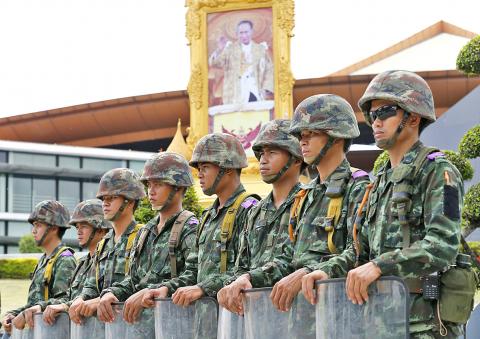Thailand’s army chief imposed martial law yesterday after months of deadly anti-government protests caused political paralysis, but insisted the intervention did not amount to yet another military coup.
Gun-toting troops fanned out after martial law was declared in a dawn broadcast, as General Prayuth Chau-ocha exploited centuries-old legislation that confers far-reaching powers on the armed forces to act in an emergency.
However, he left the caretaker civilian government in office and later invited the country’s warring political factions to sit down for talks, as the US, Japan and Southeast Asian nations urged Thailand to stay on a democratic track and resolve its differences peacefully.

Photo: EPA
Soldiers and military vehicles were seen in the heart of the capital’s retail and hotel district. Troops were also positioned at TV stations, where broadcasts were suspended under sweeping censorship orders, although regular Thais appeared largely unfazed.
The dismissal of former Thai prime minister Yingluck Shinawatra earlier this month in a court ruling has stoked tensions in the kingdom, which has endured years of political turmoil.
Red Shirt supporters of Yingluck and her brother, former Thai prime minister Thaksin Shinawatra, who was deposed in a 2006 coup, have warned of the threat of civil war if power is handed to an unelected leader, as the opposition demands.
Thaksin, who lives abroad to avoid a jail term for corruption, said on Twitter that the imposition of martial law was “expected,” but must not “destroy” democracy.
New York-based Human Rights Watch branded the imposition of martial law a “de facto coup,” voicing alarm at the impact on freedom of expression.
The government officially remained in office and Prayuth presented himself as a mediator.
“We are in the process of inviting both sides to talk but at the minute the situation is still not normal... that’s why I have had to invoke martial law,” he told reporters. “The military will not tolerate any more loss of lives.”
Martial law allows the army to ban public gatherings, restrict people’s movements, conduct searches, impose curfews and detain suspects for up to seven days.
Thailand has been without a fully functioning government since December last year, disrupting government spending, spooking investors and deterring tourists.
The early-hours announcement on military-run television said martial law had been invoked “to restore peace and order for people from all sides” after nearly seven months of protests that have left 28 people dead and hundreds wounded.
“This is not a coup,” it said. “The public do not need to panic, but can still live their lives as normal.”

SECURITY: As China is ‘reshaping’ Hong Kong’s population, Taiwan must raise the eligibility threshold for applications from Hong Kongers, Chiu Chui-cheng said When Hong Kong and Macau citizens apply for residency in Taiwan, it would be under a new category that includes a “national security observation period,” Mainland Affairs Council (MAC) Minister Chiu Chui-cheng (邱垂正) said yesterday. President William Lai (賴清德) on March 13 announced 17 strategies to counter China’s aggression toward Taiwan, including incorporating national security considerations into the review process for residency applications from Hong Kong and Macau citizens. The situation in Hong Kong is constantly changing, Chiu said to media yesterday on the sidelines of the Taipei Technology Run hosted by the Taipei Neihu Technology Park Development Association. With

CARROT AND STICK: While unrelenting in its military threats, China attracted nearly 40,000 Taiwanese to over 400 business events last year Nearly 40,000 Taiwanese last year joined industry events in China, such as conferences and trade fairs, supported by the Chinese government, a study showed yesterday, as Beijing ramps up a charm offensive toward Taipei alongside military pressure. China has long taken a carrot-and-stick approach to Taiwan, threatening it with the prospect of military action while reaching out to those it believes are amenable to Beijing’s point of view. Taiwanese security officials are wary of what they see as Beijing’s influence campaigns to sway public opinion after Taipei and Beijing gradually resumed travel links halted by the COVID-19 pandemic, but the scale of

A US Marine Corps regiment equipped with Naval Strike Missiles (NSM) is set to participate in the upcoming Balikatan 25 exercise in the Luzon Strait, marking the system’s first-ever deployment in the Philippines. US and Philippine officials have separately confirmed that the Navy Marine Expeditionary Ship Interdiction System (NMESIS) — the mobile launch platform for the Naval Strike Missile — would take part in the joint exercise. The missiles are being deployed to “a strategic first island chain chokepoint” in the waters between Taiwan proper and the Philippines, US-based Naval News reported. “The Luzon Strait and Bashi Channel represent a critical access

Pope Francis is be laid to rest on Saturday after lying in state for three days in St Peter’s Basilica, where the faithful are expected to flock to pay their respects to history’s first Latin American pontiff. The cardinals met yesterday in the Vatican’s synod hall to chart the next steps before a conclave begins to choose Francis’ successor, as condolences poured in from around the world. According to current norms, the conclave must begin between May 5 and 10. The cardinals set the funeral for Saturday at 10am in St Peter’s Square, to be celebrated by the dean of the College